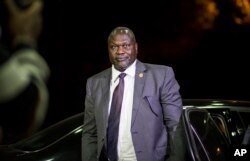South Sudanese President Salva Kiir and rebel leader Riek Machar met Wednesday for their first face-to-face meeting in two years.
The meeting in Ethiopia’s capital, Addis Ababa, comes amid efforts to end the world’s youngest country’s nearly five-year civil war, which has killed tens of thousands of people and forced about 4 million to flee their homes.
The outcome of the much-anticipated meeting is unknown, but many observers are paying close attention.
Casie Copeland, a senior analyst at the International Crisis Group, said if the meeting does not go well, and Machar and Kiir walk away, it will call into question whether the Intergovernmental Authority on Development (IGAD), a regional trade bloc of eight African countries, can move forward with some kind of peace process.
“No one has a great idea of who could take over a process other than IGAD. And if IGAD didn’t succeed, why would anyone else be able to?” Copeland said on the VOA radio program South Sudan in Focus.
Earlier this month, the U.N. Security Council delayed a decision until June 30 to impose travel bans and freeze assets on six South Sudanese leaders accused of impeding the peace deal. Those options are still on the table pending a review of the government and opposition parties’ commitment to adhere to a cease-fire agreement.
Copeland said the June 30 deadline makes the Kiir-Machar meeting critically important.
Brian Adeba, deputy director of policy for the Enough Project, agrees, but said the region should expand its focus beyond the two men.
“The danger of calling Riek Machar to Addis Ababa ... rests in the fact that there might be an elite deal, an elite pact, between Riek Machar and Salva Kiir. That would be counterproductive to the peace process entirely, because the conflict has evolved significantly. And it involves several other actors,” Adeba told South Sudan in Focus.
Most of the other groups have joined the South Sudan Opposition Alliance (SSO), an umbrella group of the opposition forces. They spoke out collectively in a press statement Monday.
SSO spokesman Kwaje Lasu said IGAD’s latest proposal gives more positions to the Kiir administration than the opposition parties. He said the alliance will refuse to sign a deal that does “not address the root cause” of the conflict.
“It represents a turning point in many ways. It is a recognition that Riek Machar is still crucial, and it debunks the assertion by the region and the government of South Sudan that Riek Machar is no longer relevant in these talks,” Adeba said.
IGAD has yet to release a communique with information detailing what occurred on Wednesday. Kiir and Machar are expected to meet on Thursday in Addis.
Meanwhile, Juba residents and internally displaced people sheltering in a U.N.-run camp said they hope the meeting will end the fighting.
“I would like Riek Machar and Salva Kiir to reconcile and change the situation for the better because people are suffering very badly. If they can hear our voice, that is to make peace, then later we can vote,” Juba resident Abuor Mabien Nhial told South Sudan in Focus.
Nhial was referring to national elections that were supposed to take place in South Sudan this year, according to a previous peace agreement signed by the warring parties. But since the cessation of hostilities, the agreement has not been upheld by either side, and the elections are still in doubt.
Dut Dau, another Juba resident, urged the two men to be open while negotiating.“I am glad to hear our president has left for Addis to meet Machar. And the only thing I could say is for our leaders to understand themselves. They should understand themselves before they [make] their demand,” Dau told VOA.
Internally displaced person Jeremiah Gai, who resides at the UNMISS Protection of Civilians Site in Juba, told South Sudan in Focus, “They have to bring peace to the citizens of South Sudan. This is the hope of all IDPs.”

